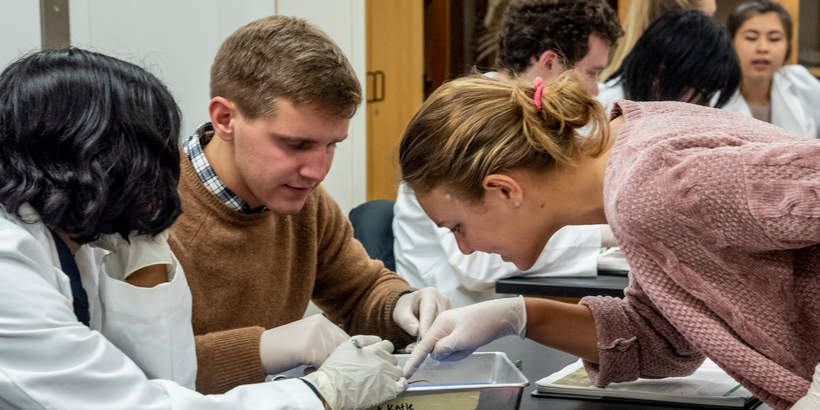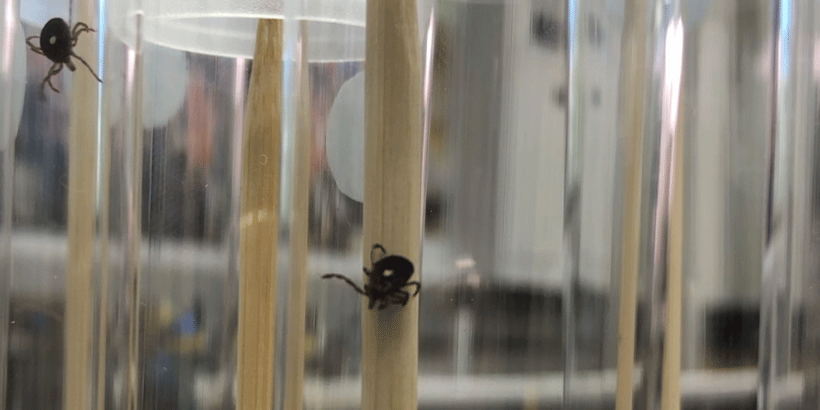Conducting Undergraduate Research: Natural Science
The opportunity to engage in undergraduate research can be an enlightening and transformational experience in a student’s academic career. However, it can also be intimidating to try to enter into the world of academia as a first-year student with little to no prior research experience. Having a better understanding of what an undergraduate research experience looks like can be a helpful tool as first-year and prospective students plan their next steps in their academic endeavors.
If you’re exploring a major in the Natural Science Division, you might expect to participate in research during your undergraduate career, but few schools allow undergraduates—including those in their first year—to play as large a role in research activities as Pepperdine does.
Pepperdine is committed to supporting scholarship and meaningful undergraduate research through internal and external grants and research programs. One of these internal grants is the Academic Year Undergraduate Research Initiative (AYURI), which supports faculty-student research collaborations across all academic divisions. If their proposal is accepted, faculty members receive funding to work with the student(s) on research while eligible students receive a scholarship. Students that receive AYURI funding present at the annual Seaver College Research and Scholarly Achievement Symposium.

Research Topics
Within the Natural Science Division, students and faculty research a great variety of subjects. This semester the AYURI program at Pepperdine awarded 20 grants to fund a diverse array of research projects. Two of this semester’s Natural Science Division award recipients were research projects led by assistant professor Leah Stiemsma and then student Courtney Hoskinson (’21) and associate professor of biology Javier Monzón and former students Lauren Dedmon (’21) and Jahred Quan (’21).
Stiemsma and biology major Hoskinson worked on a project that involved analyzing the bacteria that live in the breast tissue in order to determine what those bacteria are doing to either promote or protect against tumor development.
We are definitely seeing that there are some bacteria that are more or less abundant in women’s breast tissue before they get cancer,” shares Stiemsma regarding their findings. “This information could be used to create a diagnostic tool in the future.”
Monzón, Dedmon, and Quan also researched a topic related to the medical field, but their research subjects looked a bit different.
During my junior year I took a class with Dr. Monzón, and we discussed how unexpected factors, such as the behavior of ticks, could influence disease,” says Dedmon. “After the class, Dr. Monzón, a few of my peers, and I decided to begin formal research on how climate affects the survivorship and host-seeking behavior of medically relevant ticks.
A Unique Experience
Each faculty-student research relationship is different, and each research experience is unique, bringing something new to the academic experience. Often these faculty-student research projects arise after a professor has had a student in class. Professors may approach students after seeing the work they’ve produced in class, or students might take the initiative to reach out to professors if they have an idea for a project they want to work on or see that the professor is researching something interesting. The responsibilities of a student-researcher can vary as well, depending on the dynamic of the faculty-student relationship and the nature of the project itself. Some students lead the research with faculty assistance while others fill a data-gathering or -analysis role.
"At other places with grad students, the thought is undergrads get hired to clean things and maybe do an occasional experiment, or they get passed off to a grad student who gives them busy work,” shares Stiemsma. Far from “busy work,” Hoskinson had a hands-on role in the research, analyzing data and doing computations on Pepperdine’s new research-computing servers.
Working with a professor on a research project also allows for a personal and academic mentorship to develop.
“Dr. Monzón has been such a great mentor to me. He helped me through the process of applying to master's programs and worked with me on my ability to answer questions at a graduate-level interview,” Dedmon shares. “You also get to know the professors from a different perspective. Dr. Monzón is very serious in class, but he’s really funny when we’re researching. Researching with professors lets you get to know them more as a person rather than just as a professor.

Beyond the Lab
Both students and faculty herald undergraduate research as an invaluable and life-changing experience.
Having this background in scientific research has aided in my gaining entry to graduate schools and obtaining funding for future projects, shares Hoskinson. After graduation, Hoskinson will begin graduate school and work for Stiemsma’s former PhD supervisor.
Dedmon's career path was heavily influenced by her undergraduate research experience as well: “I had originally planned to go straight to medical school, but Pepperdine showed me how much I loved research and that I want to continue on that path first. I’m now planning to pursue a master’s in addiction research before attending medical school.
While undergraduate research is an excellent addition to a resume or portfolio, Stiemsma adds, “I definitely think doing research changes students’ perspective of science. Doing research in a lab with no grade associated with it is so different from taking a class. It's very much reflective of what they could do someday after graduation.
In addition to the act of research, students have the opportunity to gain professional presentation experience through the annual Seaver College Research and Scholarly Achievement Symposium. Some faculty-student research teams also submit their findings to other professional conferences, supplementing students hands-on experience in the research submission and presentation process.
Hoskinson shares, I feel extremely fortunate to have been able to conduct research with a professor. I not only contributed to a meaningful research project, but I also built relationships and connections with both professors and peers that will last long after my graduation from Pepperdine.